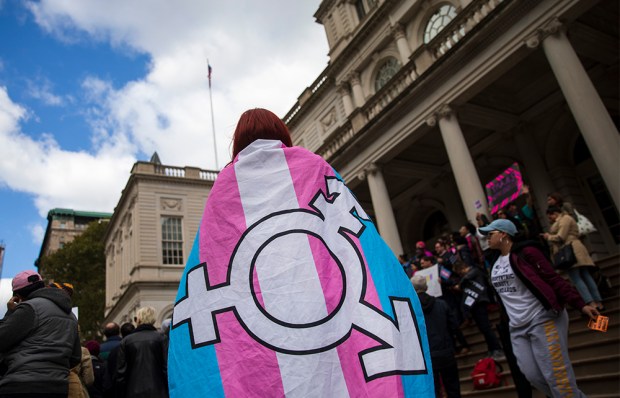It’s a strange reflection of our times that with so much else at stake, the leaders of both main parties have been asked, at their party conferences, whether they think that only women have cervixes. Both men prevaricated. Sir Keir Starmer declared this is ‘something that shouldn’t be said’. Boris Johnson avoided the question altogether.
It is a straightforward biological fact that only women have cervixes, but simply stating it was more than the Prime Minister and the leader of the opposition were prepared to do. Rosie Duffield, a Labour MP, faced such a ferocious backlash after making this statement that she felt she could not safely go to the Labour party conference.
Johnson’s diplomatic non-answer — that everyone needs to be treated with respect in the debate over the rights of transgender people — sounded reasonable. It echoed the response of Sadiq Khan, the Mayor of London, when he said Duffield should indeed be welcome at Labour conference, and that people should be able to ‘debate, discuss, have disagreement in a respectful way’.
But how much better would it have been if the Prime Minister had stood up for the obvious. ‘I utterly understand the predicament faced by those with gender dysphoria,’ he could have said. ‘We as a government are committed to helping them and we will never tolerate hate. But we can support minority groups without redefining basic words like “man” and “woman”, or hounding people who use such words.’
That Johnson was so vague on such a basic issue is indicative of a far wider problem. Already there are police officers who apparently believe it is a ‘hate incident’ (if not quite a crime) to express, for example, the view that only men have penises. They think this way because of a lack of guidance and leadership, and a lack of understanding of how important it is to protect free speech. This in turn has created a culture in which everyone, even the government, is running scared of angry mobs.
When the Labour MP David Lammy was asked about women and cervixes last week, he responded with a question. Why, he demanded to know, was the BBC so obsessed with the matter? Constantly asking politicians about trans rights only inflames the debate, and makes it seem as if it’s Westminster rather than the media which is preoccupied with the subject.
If MPs were genuinely interested in the rights of trans people, they might look at waiting times for accessing gender identity services on the NHS. As of last year, there were more than 13,500 trans people on the waiting list for such clinics. Patients in England are supposed to wait no longer than 18 weeks between their GP referring them to a consultant and their treatment beginning. Gender dysphoria patients are waiting 44 months in Leeds, 46 months in Northamptonshire and 47 months in Cumbria, Northumberland and Tyne & Wear. Thousands in Devon are facing a delay of up to 64 months.
Either such services are provided by the NHS or they are not: the far longer delays facing trans patients are far more important than the war over pronouns. For trans people, as for other people, the important issues are working conditions, housing and healthcare. It does no one any good if our politicians let themselves be swayed by small bands of online activists.
As Frances Haugen, formerly a data scientist with Facebook, revealed this week, algorithms to supply news feeds to individuals have been tailored to draw users’ attention towards issues that provoke extreme reactions. If you have previously expressed interest in, say, Keir Starmer’s comments on women and cervixes, you can expect to be fed ever more stories on this subject, and fewer stories on the economy and foreign policy.
The challenge for political leaders is to avoid being manipulated. If they are to address the everyday concerns of the greater part of British society, they must learn to resist being influenced by those who try to change the culture by changing the English language.
Boris Johnson is said to loathe what he regards as culture wars. It is understandable that he tries to bat away questions on which he feels his answers may attract impassioned objections from a handful of people. But there comes a point where it is necessary to be more blunt, and to assert that no, you will not be drawn into denying reality just to appease a noisy political group. Nor will you allow the politics of language to stand in the way of helping vulnerable and often marginalised groups, who face far bigger issues than manufactured political rows.
Shutting down a range of perspectives, especially those with scientific backing, will do nothing to improve the lives of the trans community — which activists insist is their main goal. This can be done while speaking plainly about basic points concerning gender identity. There is a middle ground here, waiting for the Prime Minister to claim it.
Got something to add? Join the discussion and comment below.
Get 10 issues for just $10
Subscribe to The Spectator Australia today for the next 10 magazine issues, plus full online access, for just $10.
You might disagree with half of it, but you’ll enjoy reading all of it. Try your first month for free, then just $2 a week for the remainder of your first year.














Comments
Don't miss out
Join the conversation with other Spectator Australia readers. Subscribe to leave a comment.
SUBSCRIBEAlready a subscriber? Log in